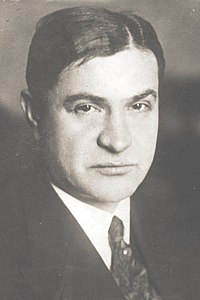Bronisław Pieracki
Bronisław Wilhelm Pieracki | |
|---|---|
 Bronisław Pieracki | |
| Minister of Interior of the Republic of Poland | |
| In office 23 June 1931 – 15 June 1934 | |
| Preceded by | Felicjan Sławoj Składkowski |
| Succeeded by | Leon Kozłowski |
| Personal details | |
| Born | May 28, 1895 Gorlice, Austria-Hungary |
| Died | June 15, 1934 (aged 39) Warsaw, Poland |
| Resting place | Cemetery in Nowy Sącz |
| Nationality | Polish |
| Political party | Nonpartisan Bloc for Cooperation with the Government |
| Occupation | Politician, military officer |
| Military service | |
| Branch/service | Polish Army |
| Battles/wars | Polish-Ukrainian War |
Bronisław Wilhelm Pieracki (28 May 1895 in Gorlice - 15 June 1934 in Warsaw) was a Polish military officer and politician. As member of Polish Legions in World War I, Pieracki took part in the Polish-Ukrainian War (1918–1919) and he later supported the 1926 May Coup of Józef Piłsudski. Pieracki was a deputy to Polish Sejm from the Nonpartisan Bloc for Cooperation with the Government in 1928 and afterwards deputy of Chief of Staff.
He was a minister of internal affairs from 27 May 1931[1] to the time of his death in 1934 and posthumously awarded Poland's highest civilian and military decoration, the Order of the White Eagle.
On 15 June 1934, Pieracki was assassinated by a Ukrainian nationalist from the Organization of Ukrainian Nationalists. His death gave the Sanacja government an excuse to the creation of the Bereza Kartuska Detention Camp, which was established only two days after Pieracki's assassination. The first detainees consisted of almost whole leadership of the Polish nationalist far-right National Radical Camp (ONR), arrested on 6–7 July 1934.[2]
Stepan Bandera and Mykola Lebed were also sentenced to death for the assassination. Their sentences were commuted to life imprisonment but Lebed escaped when the Germans invaded Poland in 1939.[3]
Honours and awards
- Order of White Eagle
- Order of Polonia Restituta
- Silver Cross of the Virtuti Militari
- Cross of Valour - four times
- Gold Cross of Merit
- Order of the Cross of the Eagle Class I (Estonia, 1934)
See also
References
- ^ Robin L. Bidwell, "Bidwell's Guide to Government Ministers Vol.1, The major powers and western Europe, 1900-1971", Frank Cass & Co Ltd, 1973, ISBN 0-7146-2977-4, p. 191.
- ^ Rudnicki, Szymon (1977). "Rozbicie ruchu młodzieżowego "Obozu Narodowego"". Dzieje Najnowsze. 9 (1): 23–46 (43).
- ^ Breitman, Richard; Norman J.W. Goda (2010). Hitler's Shadow: Nazi War Criminals, US Intelligence, and the Cold War (PDF). National Archives. p. 73. Retrieved 2010-12-12.
Further reading
- Template:Pl icon Andrzej Misiuk Białym żelazem, Gazeta Wyborcza, 12/07/1994.
- 1895 births
- 1935 deaths
- People from Gorlice
- Nonpartisan Bloc for Cooperation with the Government politicians
- Assassinated Polish politicians
- Polish Army officers
- Polish legionnaires (World War I)
- People murdered in Poland
- Recipients of the Order of the White Eagle (Poland)
- Recipients of the Order of Polonia Restituta
- Silver Crosses of the Virtuti Militari
- Recipients of the Cross of Valour (Poland) four times
- Recipients of the Gold Cross of Merit (Poland)
- Recipients of the Military Order of the Cross of the Eagle, Class I
